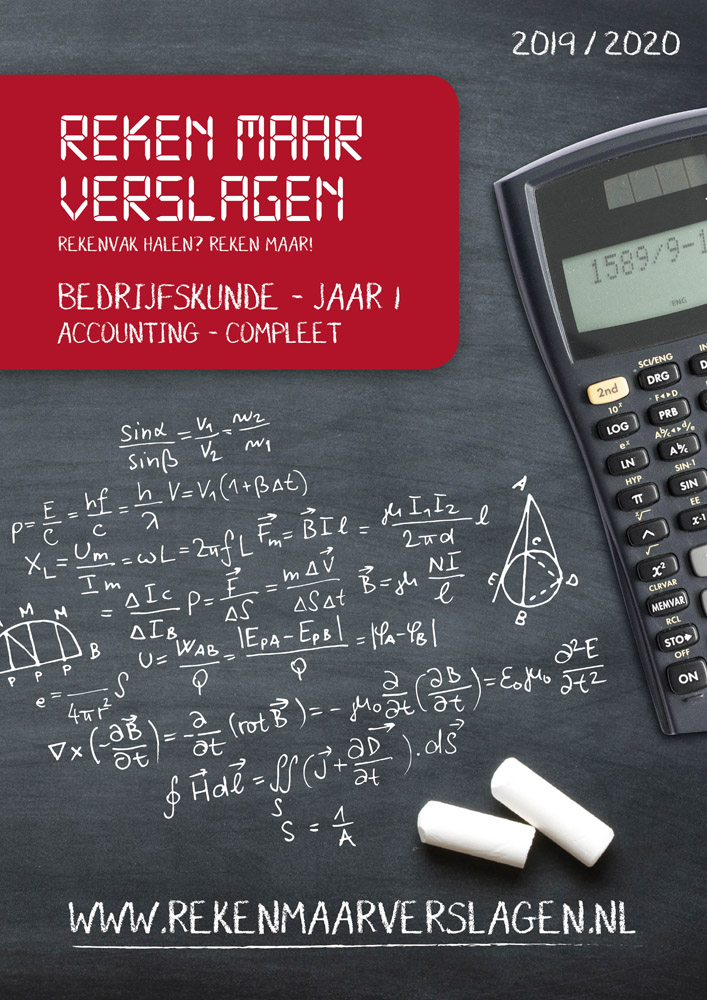No products in the basket.
< All topics
Summary Accounting Erasmus
Posted on
Last updated on
Summary
Accounting for the study of Business Administration at Erasmus University Rotterdam
EUR needed? This will make the exam a breeze!
"
"Accounting is such a boring subject for me, there is no getting through it. I wouldn't know how to get all the material in my head before the end of the week."
Do you recognise yourself in the sentence above? Then we at Reken Maar Verslagen have the solution for you.
The subject Accounting BK1206 is one of the most difficult subjects in the Bachelor of Business Administration at Erasmus University Rotterdam EUR, perhaps you have already experienced this yourself. Topics such as financial statement analysis and the balance sheet are generally perceived as very difficult by students. Would you like to get started with this right away so you can finish your accounting exam at Erasmus University with a good grade? With a summary for the accounting subject at Erasmus University Rotterdam (EUR), you will simply pass! Read on below to find out what to expect: we give you some inside info.
Would you like to get started with this right now to finish your accounting exam at Erasmus University with a good grade? Then click here to order your summary accounting!
Want to know even more about accounting or get a brief introduction to the topics within the profession? Then read on below to see what's in store for you.
Summary accounting Erasmus University Rotterdam: basic concepts
Accounting can be defined as the process of recording, summarising and analysing financial transactions. The accounting information that and company produces can be divided into two categories. There is a distinction based on who uses the information. For example, financial accounting is mainly designed for decision-makers outside the company (external). Managerial accounting, on the other hand, is mainly designed by decision-makers within the company (internal). This course focuses on the financial accounting part.
- Key concept 1: Financial statements
- Key concept 2: Cash flow statement
- Key concept 3: Financial Statement Analysis
- Key concept 4: Assets
- Key concept 5: Liabilities and equity
We go through them with you below.
Summary Accounting Erasmus University Rotterdam - Core concept 1: Annual accounts
Accounting is mainly about a company's accounts. These accounts are neatly presented in financial statements. Financial statements have several functions. For instance, they provide information about the risk and return on the company's shares. They also show how well management has performed. And they also reveal the management's plans.
The following financial statements will be covered in the summary accounting Erasmus University Rotterdam:
- Balance sheet
- Income statement
- Statement of changes in equity
- Statement of cash flows
For your exam, it is important that you recognise and can link the different financial statements a company issues. These four financial statements are used to periodically report on a company's business activities.
Accounting summary Erasmus University Rotterdam - Key concept 2: Cash flow statement
So the cash flow statement is part of the financial statements, but what is the cash flow statement itself for? And how do you calculate it? There are actually two main purposes for the cash flow statement:
- It provides insight into the trends of the company's 'liquidity' and 'solvency'.
- It explains the change in 'cash' (cash) and 'cash equivalents' (cash equivalents) of a company.
In addition, for your exam, you should be able to prepare a cash flow statement yourself. For this, two different methods are the 'direct' method or the 'indirect method'. In the accounting Erasmus University Rotterdam summary, we will cover both methods in detail using recognisable example assignments and handy practice questions that will allow you to test your newly acquired knowledge immediately.
Summary Accounting Erasmus University Rotterdam - Core concept 3: Financial Statement Analysis
Banks or other investors look at different things when analysing a company through its financial statements. In the income statement (income statement) they mainly look at profit expressed as a percentage of sales. This is the net margin. On the balance sheet, they look at what is invested to make the same amount of profit. The fewer assets needed for a given amount of profit, the better. It is also important for beacons to have a lot of cash. The more cash, the better. This is because it means that the money is not tied up in machinery or anything like that. For shareholders, it is important to have as few liabilities as possible. Shareholders need to invest less for the same return.
In the summary, all the different ratios and analyses associated with this key concept will be discussed in detail. For instance, the formulas for various profit margins such as gross profit margin), operating profit margin and net profit margin. Besides clear explanations, the summary offers plenty of examples and practice questions to practice before the exam.
Summary accounting Erasmus University Rotterdam - Core concept 4: Assets
This key concept, together with the next key concept, is part of a financial statement, namely the balance sheet. This shows all the company's assets and all the company's liabilities. This core concept is about the possessions, also called the assets. In the accounting summary Erasmus University Rotterdam, we will discuss the different ways to value assets. For instance, they can be valued based on cost, but also based on fair value.
Because assets only last a number of years, you may not deduct all costs in the year of purchase. Instead, they must be depreciated. In the accounting summary Erasmus University, we will discuss the following depreciation methods:
- Linear depreciation
- Double declining balance
- Units of production
Let's look at an example.
The van de Goot Building on the Erasmus University campus consists of different parts with different life expectancies and values:
- Frame: 60 years | 200 million
- Finish: 36 years | 50 million
- Equipment: 18 years | 20 million
- No residual value
What is the book value of the building after five years of depreciation? These kinds of questions can be perceived as tricky because there are different life years for different components. So the property cannot be depreciated in one go using one method. If you want to know how to solve these kinds of questions or learn more about this topic. Then order here The accounting summary Erasmus University Rotterdam.
Summary accounting Erasmus University Rotterdam - Core concept 5: Liabilities and equity
This core concept deals with the other side of the balance sheet. Here it looks at how all these assets are funded. This can be done with own money, or equity, but it can also occur from loans, or liabilities. Important in this core concept is the time value of money. Because you borrow money, this automatically means you have to pay money for it over time, or interest. In the summary, we pay sufficient attention to this by using recognisable examples and handy practice questions to help you master the material.
Of course, there is not only borrowed money within an organisation, but also part of the business will have to be self-funded. This is equity. Equity consists of the following components: market premium, other reserves, retained earnings, additional paid-in capital and par value. The summary accounting Erasmus University Rotterdam will clearly explain both concepts.
Summary accounting Erasmus Rotterdam: Exam structure
The exam will consist of a mix of theory questions and arithmetic questions. To master these questions, practice is hugely important. The accounting summary Erasmus University Rotterdam by Reken Maar is full of useful sample questions, practice assignments, old exam questions and practice exams. Doing these assignments will give you a good idea of what the exam will look like and you will not face any surprises on the real exam.
For the calculation questions, it is important that you know formulas well. If you don't, you will easily make mistakes in these questions. In the accounting summary Erasmus University Rotterdam we have included a formula sheet with all the formulas needed to successfully complete your exam. This way you can memorise all these formulas!
Summary accounting Erasmus Rotterdam, everything you need to succeed
As you have seen above under the key concepts, the accounting subject consists of topics with a lot of terminology and arithmetic questions. With the summary of Reken Maar, you have everything you need to prepare well for your exam. All topics and terms are clearly explained using recognisable examples and all accounting topics are clarified with practice questions.
So Count But is your best friend on the way to a good grade for your exam. Order your summaries here. On behalf of the whole of Reken Maar, we wish you good luck in preparing and taking the exam!
Do you find accounting interesting? What can you become with it?
So, as you now know, accounting is about the bookkeeping of a company. If this profession appeals to you, then you are clearly interested in the financial side of a company. You could later work as an independent accountant or work in a company's finance department. Further on in the bachelor's programme, you will encounter even more subjects focusing on financial management, here you can further discover what exactly you like and whether you actually want a career in finance.

